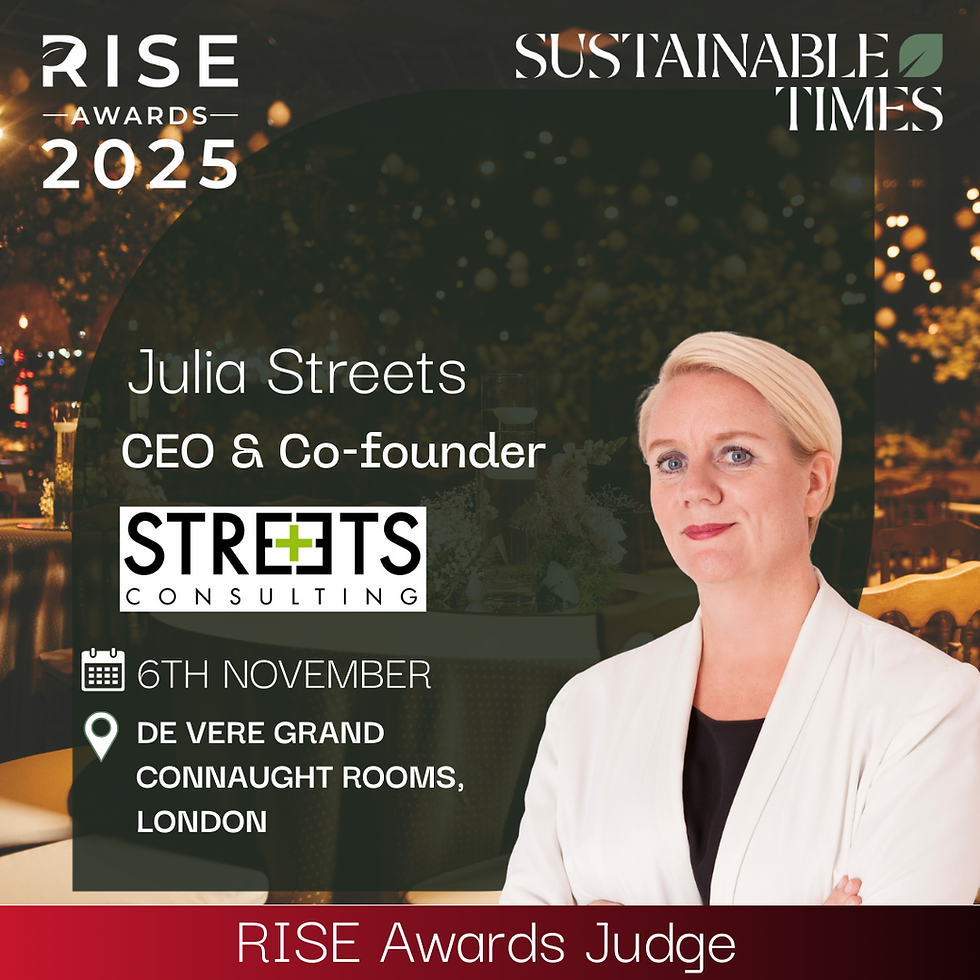Streets Maps out Green Future for Fintechs
- Daisy Moll

- Aug 28, 2025
- 4 min read

The sustainability of fintechs has been a long-term focus of Julia Streets MBE - founder & CEO of B2B business development, marketing and communications firm Streets Consulting - who recently joined the judging panel for 2025 RISE awards.
Also host of The Energy Podcast and CityAM's Impact AM show, Streets shared her insights into the evolving fintech landscape with Sustainable Times ahead of the judging process.
The deadline for RISE Awards entries has been extended to 7 September. The event, which takes place on 6 November, recognises excellence in responsible business and investment. The awards will honour individuals, organisations, and service providers in a range of categories including Clean Tech, Green Transport, Sustainable Fashion, AI Startup of the Year, Wealth Manager of the Year, Best Bank for Sustainable Finance amongst others.
Fintechs are reshaping the way individuals and businesses access financial services. Spanning payments, lending, wealth management, insurance and blockchain-based platforms, they are valued for their ability to deliver faster, more cost-efficient and user-centric solutions than traditional institutions.
The rise of fintechs has intensified competition across the financial sector, accelerated digital adoption and expanded access to credit and payments. By lowering costs and broadening financial inclusion, they not only challenge established players but also contribute to wider economic growth. Leading examples include Monzo, PayPal, Klarna, and Revolut.
Streets’ knowledge of fintechs and their impact on the finance sector stems not only from advising startups, scaleups, global organisations, industry bodies and technology incubators, but also from her prior roles as Global Head of Communications at NYSE Technologies and as European Head of Marketing at Instinet Europe.
Doubling down
Increasingly, says Streets, the future of fintechs is entwined with their ability to support sustainable growth.
Supply chain transparency stands out, she explains, particularly amid rising tariffs and heightened scrutiny of corporate exposure to supplier risks. “I still double down on due diligence supply chain potential,” she asserts. Tools that help private equity and venture capital firms to measure and manage these vulnerabilities among their portfolio companies are becoming essential. “And if you’re a corporation, your suppliers can present a huge risk,” she adds.
At the SME level, embedded carbon analytics within banking platforms could unlock scale by helping millions of smaller businesses track carbon emissions, automate reporting, and access tailored green financing such as sustainability-linked loans.
For large financial institutions, climate risk and transition analytics that map asset and location data to physical and transition risk scenarios will prove critical for pricing, capital allocation and regulatory compliance.
Finally, payments and ecommerce services are increasingly being decarbonised through innovations that integrate emissions insights at point of sale, alongside robust offset and abatement marketplaces, as payments networks and service providers move to embed sustainability into their products.
Greater scrutiny
All corporates and finance providers, including fintechs, are increasingly under scrutiny regarding the credibility of their sustainability metrics, with greenwashing emerging as a significant risk, particularly in relation to the quality and reliability of emissions and impact data.
Streets stresses the importance of companies establishing assurance-ready controls and robust claims governance aligned with the Financial Conduct Authority’s (FCA) anti-greenwashing rule, ensuring that sustainability claims can withstand regulatory and stakeholder examination. In practice, this means anchoring product language to the definitions set out in the UK’s Sustainability Disclosure Requirements (SDR) and Transition Plan Taskforce (TPT) frameworks, and underpinning all assertions with clear, verifiable evidence.
These regulatory requirements can provide opportunities for fintechs, says Streets. “As the UK rolls out transition plan expectations and aligns with International Sustainability Standards Board (ISSB), fintechs that operationalise TPT-aligned plans - across targets, metrics and financing - for corporates and financial institutions will grow,” she adds.
Streets emphasises that investor interest in sustainability-led investment funds remains strong, with positive implications for fintechs that support their supply and demand. Total assets invested in European sustainability-focused funds now surpasses €6 trillion, and more than half of all funds launched in Europe in 2024 were sustainability focused.
In contrast to the prevailing narrative in the US, investor attention is increasingly turning to Europe. “This is a great opportunity for the UK,” she says.
Critical areas
Streets’ advice to investors looking to get involved with a sustainable fintech is to sharpen their focus on three critical areas. First, regulatory fit is emerging as a core value driver: products that enable customers to comply with SDR, anti-greenwashing rules and TPT requirements through audit-ready disclosures, robust claims controls and credible transition-plan execution should benefit from structural demand, and due diligence should rigorously test this alignment.
Second, evidence must take precedence over narrative; green claims and impact outcomes need to be measurable, repeatable and defensible, ideally stress-tested under Bank of England–mandated scenarios to demonstrate tangible returns in the form of loss avoidance, capital benefits or new revenue.
Finally, the need for scalability at the SME level represents a major opportunity for fintechs. Given persistent measurement gaps among smaller businesses, the most effective and potentially highest-return solutions are likely to be distributed through banks, payment service providers and accounting platforms.
“Investors should probe channel economics and data permission,” she says.
If you are a startup or scaleup that is looking for recognition of your work sign up to the RISE Awards.





![LOGOTYPE [GREEN_DARK GREEN].png](https://static.wixstatic.com/media/d6e0b6_7c15be730f2c42d4ad22da5f1e69fa35~mv2.png/v1/fill/w_877,h_198,al_c,q_85,usm_0.66_1.00_0.01,enc_avif,quality_auto/LOGOTYPE%20%5BGREEN_DARK%20GREEN%5D.png)



Foodle fosters a learning community too. Because food is universal, players often exchange favorite words, discuss obscure ingredients, share culinary trivia.